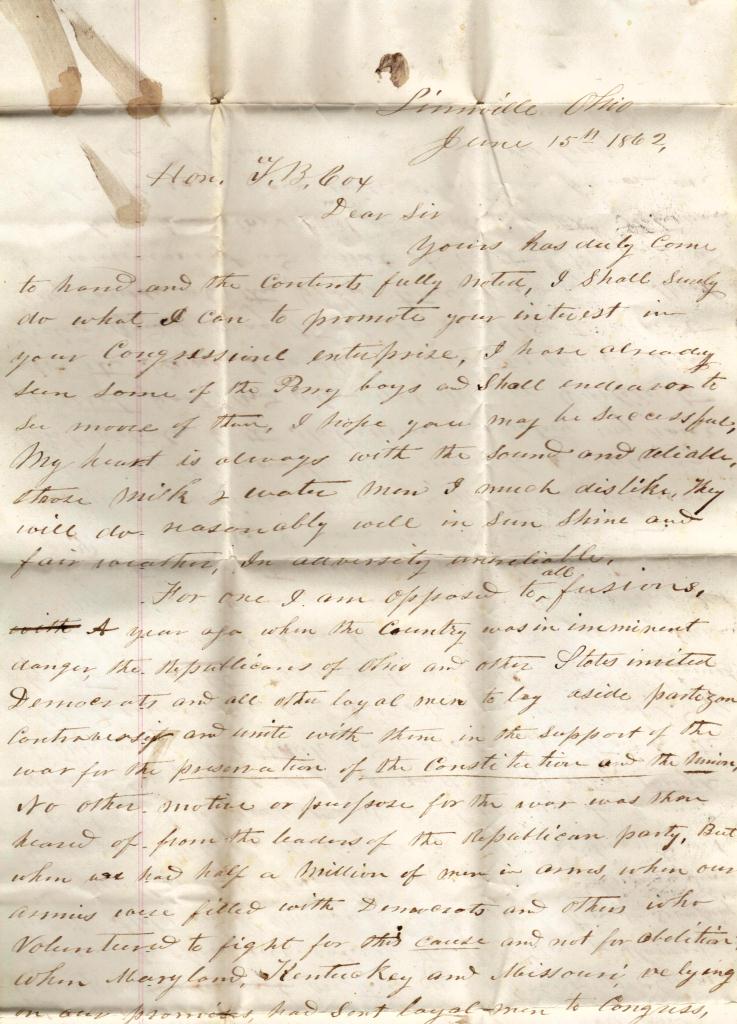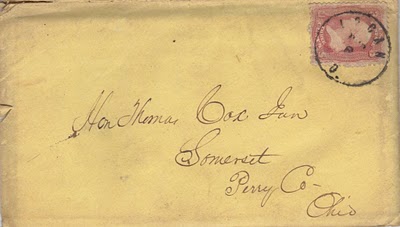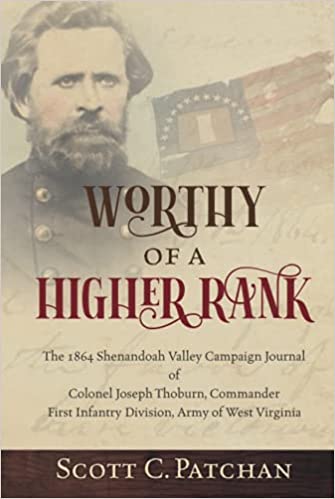
For me, one of the great joys of researching and writing about Civil War history is “reading other people’s mail.” Whether in archives, digitized sources online, or in books, reading letters is one of my favorite things to do. Their appeal is in their immediacy (as opposed to post-war memoirs, for example) and in their (assumed?) privacy.
As a collector of 19th-century correspondence, it is my great pleasure to have a cache of about 10 letters to and from Thomas B. Cox, Jr., of Ohio, from 1860 through 1864, that shed light on the thoughts of anti-war Democrats in the Buckeye State. It is one thing to read about Copperhead sentiment during the war years; it’s quite another to hold letters, read the words, and sense the anger and venom.
According to A Biographical Record of Fairfield County, Ohio, Illustrated (New York: S.J. Clarke, 1902), Thomas B. Cox, Jr., “is honored and respected by all…there is no man in Fairfield County who occupies a more enviable position in business circles than Thomas B. Cox.” Cox was born in 1826; his father, Thomas B. Cox, was born in the vicinity of Gettysburg, Pennsylvania, in 1797, and in 1807 came with his father, James Cox, and the family to Fairfield County, Ohio. T. B. Cox, Jr., attended village schools, became superintendent of a grain business and also conducted a store in Greencastle. In 1857 he established a store in New Lexington, Perry County, Ohio, and while there was elected a member of the city council.
It seems that Cox—like his father—was very much involved in local Democrat Party politics and, if the letters below are any indication, had strong anti-abolition and Copperhead sympathies and friends.
I happily provide summaries and/or excerpts from several of the letters below. The tone of the letters speaks to a pretty vitriolic discourse—at least in private— when Democrats are writing of Republicans.
May 14, 1860—to Thomas B. Cox from C. W. Tector (?)—no cover—seems to concern local politics and a possible previous election contest between the correspondents.
August 13, 1860—to Thomas B. Cox from S. Milton Teal—with stamped cover—seems to concern the state or local nominating conventions and dissatisfaction with some of the candidates in pretty sever terms. For example: “…he has caused divisions and dissention in the party ever since he forced his rotten, filthy, corrupt Whig carcass upon us….”
September 30, 1861—to Thomas B. Cox from E. Manning—no cover—talks of the county Democrat Party convention. He writes:
“I have repeatedly expressed myself in regard to this Black Republican war…that it never could produce anything but carnage and bloodshed and bankruptcy and ruin….”
February 5, 1862—to Thomas B. Cox from Silas H. Wright—with cover— concerns Cox’s advocacy for a bill which would prevent emigration of freed African Americans into Ohio. Wright writes: “..the people of Southern Ohio is likely to be overrun by refugee blacks while the northern or abolition counties of the state will be comparatively free from their terrible visitation owing to the natural dislike and repugnance which the negros have to that class of animal.”
June 11, 1862—to Thomas B. Cox from Jacob Costigan—with cover— Costigan supports Cox’s intent to run for Congress. Costigan writes that he is “…a Radical Democrat of the deepest degree. Yes, so far as to endorse the much abused and villified Clement Vallandingham believing him to be the very best man now in Congress.”
June 15, 1862—to Thomas B. Cox from William Parr, Linnville, OH—no cover—beginning of letter concerns Cox’s interest in running for Congress and Parr supports him. The balance of the letter concerns Parr’s strong feelings against abolition as a war policy. The letter reads, in part:
Dear Sir:
Yours has duly come to hand and the contents fully noted. I shall surely do what I can to promote your interest in your Congressional enterprise. I have already seen some of the Perry boys and I shall endeavor to see more of them. I hope you may be successful. My heart is always with the sound and reliable. Those milk and water men I much dislike. They will do reasonably well in sunshine and fair weather. In adversity: unreliable.
For one, I am opposed to all fusions. A year ago when the country was in imminent danger, the Republicans of Ohio and other States invited Democrats and all other loyal men to lay aside partisan controversies and unite with them in support of the war for the preservation of the Constitution and the Union [note: all underlined test is such in original]. No other motive or purpose for the war was then heard of from the leaders of the Republican Party. But when we had half a million men in arms, when our armies were filled with Democrats and others who volunteered to fight for this cause and not for abolition; when Maryland, Kentucky, and Missouri relying on our promises had sent loyal men to Congress, opened their territories to our troops an placed themselves in our power – then first we heard that slavery being the cause of the war, slavery must be destroyed.
It is notorious at this day a large portion (to say the least) of the Republican Party repudiate these pledges and trample on their own Chicago platform. They are the open advocates of the abolition of slavery in the States, and of measures of confiscation so sweeping an relentless, that their like has not been known since the days of William the Conquerer.
This has turned out just as I anticipated at the beginning. So I am glad in my soul that I (with many others though a minority, but thank God a respectable minority) stood by the Old Democratic organization and was not led off by those soft Democrats and d_mn Abolitionists.
In the wake of our recent campaign and election season, we do well to remember that rancor and hyperbole in politics is timeless; with the proper detachment and interpretation, the vitriol can be interesting to study and interpret…as long as we don’t come to despair of our species.

James Schmidt is currently in the process of transcribing and editing these letters. Scholars interested in anti-war or Copperhead sentiment in Ohio can contact him at [email protected].
Illustrations courtesy of James M. Schmidt Collection.
